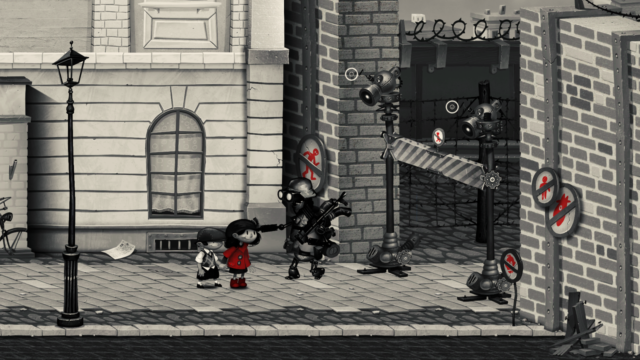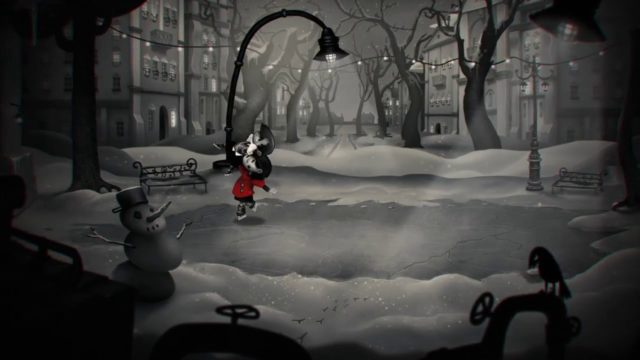Beautiful presentation; thought-provoking puzzles; terrific storytelling; Patrick Stewart's narration is a delight
Sometimes it's hard to know what to do in certain puzzles; occasional moments of slow-down
Last April, a survey conducted by the Conference on Jewish Material Claims Against Germany showed that a growing number of Americans don’t know important details regarding the Holocaust. With that in mind, My Memory of Us couldn’t come at a more important time. Released just days before Holocaust Remembrance Day, the title offers a compelling story based on the World War II era.
My Memory of Us is a fictionalized retelling of the Nazi occupation of Poland. Set in The City, the game follows a nameless pair of children as they work together to survive an invasion by an army of robots. The robots have labeled some citizens “red folk” forcing them to wear the scarlet color and preventing them from accessing parts of The City. The girl character is one of the red folk while the boy is not. In order to survive and help the other red folk, the pair must work together.
Over the years, lots of video games have tasked players with controlling two different characters simultaneously. As in games like Resident Evil Zero, puzzles in My Memory of Us tend to revolve around finding ways to solve different elements of a puzzle with their respective character. The boy and girl have different abilities that play a part in these puzzles, but a number of them revolve around his ability to move about The City fairly unencumbered while her movement is often hampered. In other games, this can get frustrating, because it seems unfair. In My Memory of Us, the unfairness is part of the game’s central theme: there truly is no reason the girl should have to deal with these restrictions because they’ve been arbitrarily placed upon her and others that have been labeled “different.” It truly hammers home the cruelties the Nazis inflicted on the Jewish community.

Despite the fictionalized take, the robots in My Memory of Us are, arguably, one of the most faithful takes on the Nazis in a video game. Though the World War II era has been revisited in a countless number of games over the years, the Nazis are often depicted as some generic foe. Those games tend to ignore or gloss over the casual ignominies and dehumanization perpetrated by Hitler and his followers; that isn’t the case in My Memory of Us. One puzzle in the game required the boy and girl to find food for a dog. When I went down a particular alley as the boy, I encountered a group of robots who ignored my presence. When I went down that same alley as the girl character, they drew their weapons and forced her to do a dance for their amusement (via timed button presses). The task took a few tries, but the “reward” was rather jarring: the robots tossed a dog bone to the girl for her troubles. While the item helped me solve the puzzle, the treatment of the girl was unnerving and the connotation unmistakable. It’s these minor details that make the game feel different from other offerings.
Most of the game’s puzzles can be thought-provoking or clever, but they can also prove frustrating, at times. All of the communication in the story comes via stylized word balloons, featuring images and symbols. It’s a clever touch that works well with the game’s aesthetic, but it can lead to some confusion when it comes to solving puzzles. Sometimes there’s a vagueness that can make things more difficult than they should be, and it can be difficult at times to make out the image inside the word balloon. Most times, I was able to figure things out with little frustration, but there were also times that I (eventually) guessed lucky.
While none of the characters in the story actually speak, the beginning of each chapter is narrated by Patrick Stewart. Stewart is a true delight, breathing so much life into the game’s story, perfectly capturing the idea of an elder passing down his story to the next generation. The music is mostly somber, but the developers are careful to keep things from getting too depressing or gloomy. The game’s protagonists are children, after all, and kids have a knack for finding ways to discover light in the darkness. The music gives these moments the same attention, and the game is all the more balanced for it.

Graphically speaking, My Memory of Us is gorgeous. The game’s color palette strictly uses variations of black, white and red and it perfectly fits the game’s tone and style. The characters are well designed and, despite the fictionalized take, both the red folk and the robots perfectly evoke the time period.
The game’s narrative may be fictionalized, but the developers found plenty of ways to educate players on the events that inspired it. Strewn throughout each chapter are “Memories.” Once found in the game, Memories can be accessed from the main menu, where they detail real-life people from the Holocaust era. As far as unlockables go, it’s a terrific addition to the game, and it adds another opportunity to teach the audience.
Pundits continue to debate the merits of video games as an art form, and My Memory of Us is yet another strong argument for what the industry can do at its best. My Memory of Us is the rare game that feels important, while also providing an engaging experience. It’s tragic that we need reminders of what the Jewish people went through but, in a time when many Americans don’t know the history of the Holocaust, it’s wonderful to have a game that encourages learning in a new and interesting way. Sometimes knowing how to solve each puzzle can be a little frustrating, and the game does have some occasional slowdown, but these are minor quibbles, at best. My Memory of Us is an unmissable experience.
Nintendojo was provided a copy of this game for review by a third party, though that does not affect our recommendation. For every review, Nintendojo uses a standard criteria.




 ShareThis
ShareThis





